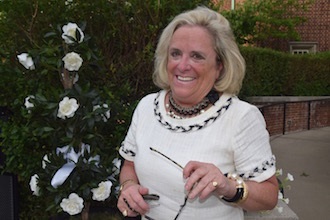From the Mayor: Bronxville Continues Long History of Thoughtful Planning

By Mary C. Marvin, Mayor, Village of Bronxville
Oct. 17, 2018: As the trustees continue with our week-to-week business, our overarching goal of an updated village comprehensive plan remains the long-term focus. The plan will serve as a policy guide for the village’s future characteristics and development. It will be the sixth such plan since the inception of such plans in 1971 and fulfills a Village of Bronxville code directive to “adopt a plan for the physical, economic and social development of the village.”
Bronxville leaders early on recognized the need for thoughtful planning, land use, and density and adopted our first zoning ordinance in 1922. The bulk of our current zoning code was enacted in 1958 and amended as the need arose. In response to New York State enabling legislation and a desire by the then trustees to develop a master plan for the village, a committee was formed. Under the chairmanship of Marvin Bower, our first plan, titled “Community Plan: Guidelines for Change in Land Use,” and in 1980, the planning commission, chaired by Lucille Pickwick and Alfred DeCrane, Jr., adopted an even more comprehensive version.
In 1985, a land use committee chaired by William Staudt specifically addressed the central business district, and many zoning changes were enacted as a result of the committee’s recommendations. A number of subject-specific committees and studies have been undertaken since, addressing parking needs, business ordinances, and large project development.
Fast-forward to the Community Plan of 2002, when many of the goals and objectives from past studies were culled into one document that stands the test of time. A compilation of decades of study, it proves as relevant today and serves as a valuable template to measure any changes going forward.
Overall Goals
The overall purpose of this community plan is to maintain Bronxville as a small-scale, attractive community in which the pattern and quality of land uses reflect the needs of residents, businesses, institutions, and other interest groups within the village.
To achieve this overall goal, the community must
-
Preserve and promote the special architectural character and appearance of existing buildings and neighborhoods.
-
Maintain the natural landscape of the village.
-
Retain the pedestrian scale of buildings, streets, and open spaces that currently exist in the downtown area.
-
Encourage development and land utilization that is appropriate to the existing pattern of development and that will help ensure the economic stability of the whole community.
-
Control the impacts of flooding on residential and commercial properties within the village.
Residential Area
-
Retain the roughly even balance between single-family and multi-family units.
-
Continue to encourage development of appropriately scaled multi-family units adjacent to or within the commercial business district to enhance the value of the neighborhood.
-
Preserve the quality and character of existing single-family residential zones.
Commercial Uses
-
Maintain the “village” character of the commercial business district through careful control of land uses, storefronts, lighting, and signage; adequate building maintenance; and ongoing streetscape improvements.
-
Maintain and improve the mix of retail stores, services, and other commercial uses that are geared to the needs of local residents and those in immediate adjoining communities.
-
Ensure that any new development is related in scale and character to the existing buildings within the commercial business district.
Transportation and Parking
-
Promote policies to help ensure convenient and safe traffic flow on the village street network.
-
Ensure adequate public transportation services, particularly for residents without access to private automobiles.
-
Provide for adequate off-street parking for any new multi-family development.
-
Ensure an adequate supply of parking for commuters, shoppers, merchants, and other visitors to the commercial business district consistent with the residential character of the village.
-
Encourage continued improvement in the utilization of metered parking spaces.
-
Relocate commuter parking to outlying parking parcels.
Open Space and Recreation
-
Preserve and enhance existing public open space areas with special attention to landscape improvement of village streets, parking lots, and the Station Plaza area.
-
Encourage continued use of natural landscape elements within existing development.
-
Ensure high-quality maintenance of existing recreation facilities.
Community Facilities
-
Maintain high-quality services and facilities for village residents.
-
Ensure efficient use and maintenance of public services provided by the police and fire departments and the department of public works.
Tax Base
-
Maintain balance between user fees and the costs of providing services.
-
Achieve fiscal savings without sacrificing existing high-quality village services.
-
Preserve the commercial property tax base in the commercial business district.
-
Conduct regular revaluation updates as needed to ensure that assessed property values are consistent with real estate values and other conditions.
-
Enforce regular assessment updates of individual properties to reflect any improvements that may change their assessed value.
Flood Control
-
Implement a flood protection system to protect village, school, and private property.
Photo by A. Warner
Editor's note: As a public service, MyhometownBronxville publishes articles from local institutions, officeholders, and individuals. MyhometownBronxville does not fact-check statements therein, and any opinions expressed therein do not necessarily reflect the thinking of its staff.
Government & History Directory
Bronxville is a quaint village (one square mile) located just 16 miles north of midtown Manhattan (roughly 30 minutes on the train) and has a population of approximately 6,500. It is known as a premier community with an excellent public school (K-12) and easy access to Manhattan. Bronxville offers many amenities including an attractive business district, a hospital (Lawrence Hospital), public paddle and tennis courts, fine dining at local restaurants, two private country clubs and a community library.
While the earliest settlers of Bronxville date back to the first half of the 18th century, the history of the modern suburb of Bronxville began in 1890 when William Van Duzer Lawrence purchased a farm and commissioned the architect, William A. Bates, to design a planned community of houses for well-known artists and professionals that became a thriving art colony. This community, now called Lawrence Park, is listed on the National register of Historic Places and many of the homes still have artists’ studios. A neighborhood association within Lawrence Park called “The Hilltop Association” keeps this heritage alive with art shows and other events for neighbors.
Bronxville offers many charming neighborhoods as well as a variety of living options for residents including single family homes, town houses, cooperatives and condominiums. One of the chief benefits of living in “the village” is that your children can attend the Bronxville School.
The Bronxville postal zone (10708, known as “Bronxville PO”) includes the village of Bronxville as well as the Chester Heights section of Eastchester, parts of Tuckahoe and the Lawrence Park West, Cedar Knolls, Armour Villa and Longvale sections of Yonkers. Many of these areas have their own distinct character. For instance, the Armour Villa section has many historic homes and even has its own newsletter called “The Villa Voice” which reports on neighborhood news.
Link to Village of Bronxville One Square Mile Monthly Newsletter
Village of Bronxville Administrative Offices
337-6500
Open 9:00am - 4pm excluding holidays and weekends
Bronxville Police Department
337-0500
Open 24 hours
Bronxville Parking Violations
337-2024
Open 9:00am - 4pm excluding holidays and weekends
Bronxville Fire Deparment
793-6400













